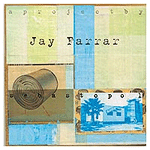|
|
|
| archive : A B C D E F G H I J K L M N O P Q R S T U V W X Y Z | ||||
|
| ||
 Jay Farrar
Jay FarrarSebastapol [Artemis; 2001] Rating: 7.7 That Jay Farrar. You just can't quite keep track of him these days. First he leaves Jeff Tweedy and the rest of Uncle Tupelo to their own devices and forms Son Volt. And now he's abandoned Son Volt (for at least for a small spell) and has recorded an album entirely his own. While he has denied on at least one occasion that Son Volt has split, Sebastopol does not include the note: "Jay Farrar appears courtesy of Warner Bros. Records." From that, we can conclude that, much like blood brothers Wilco, Son Volt and Jay Farrar are no longer related to the world-domineering Warner Bros. conglomerate. But the fact that we have a solo record at all can be interpreted in a number of ways. Did Jay Farrar get bored with the straight-ahead, twanged roots rock of Son Volt? Did he become jealous of Wilco's experiments and oddball collaborations? Whatever the case may be, Sebastopol finds Farrar seeking new musical outlets to rejuvenate his limping song formula. He looks to nonstandard guitar tunings, drenches of keyboard, and even takes up the Indian drone instrument the tambura, with varying degrees of success. But as Sebastopol stands, it looks like Jay Farrar can't escape his past. At the base of this record is still Farrar's same slight drawl-tinged vocal style, backed by musical structures that haven't journeyed very far from the days of Uncle Tupelo. Yet, Sebastopol is easily one of the more exciting things Jay Farrar has done. Not to be upstaged by Jeff Tweedy's Jim O'Rourke collaboration, Farrar enlists Superchunk's Jon Wurster on drums and the Flaming Lips' Steven Drozd to cover everything from conventional keys to melodica (as well as backing vocals), who each appear on about a third of the record. "Feel Free," the album's first track, opens with an organ line that collapses into a running drum track, fuzzy organ, and acoustic guitar. "Turn off the nonprofit radio and let it all sink in," muses Farrar on the theme of living life to its fullest on a track whose production feels satisfyingly organic. Drodze's string-emulating keyboard and monotone striking bell on "Damaged Son" turn what originated as a typical Farrar acoustic number about optimism into a quasi-orchestral extravagance. Gillian Welch and Dave Rawlings, who once upon a time worked so well with Ryan Adams, appear on "Barstow." "By the time we make it to Barstow/ We'll be more than half way to hell," laments Farrar, backed by Welch, over a tripping drum beat that transforms the standard country track into a standout. Rawlings' brooding lap steel resounds the cry of Welch's gorgeous coos in the bridge, rounding out a downright top-notch song that ranks among Farrar's best. Still, Sebastopol's 17 tracks and 50 minutes lack a consistency that would have made this record more notable. The three interludes are gratuitous, and two of these are downright annoying. "Fortissimo Wah" is 38 seconds of Farrar toying with a wah pedal on a single overdriven chord, while the 50 seconds of "Equilibrium" are just a series of glissandos on an electric guitar in an open tuning with a slide. The third "Prelude (Make It Alright)," introduces the tambura accompanied by a filtered, driving drum beat that cuts off unexpectedly, which on first-listen left me anxious for more. "Make It Alright," coming three tracks after its prelude, reverts to classic acoustic Farrar, losing the filtered beat that emphasized the ride cymbal while keeping the drenches of tambura. When heard the second time on the full-length song, the tambura concept borders on sounding contrived. The tambura returns for the album's closing track, "Vitamins," this time much less prominently in the mix and more effectively against the song's marching drums. And after the album fades out, one's view of Jay Farrar isn't all that different that when it began: the songs are pretty much the same, but the means have been slightly appended. While taking on an array of ornaments and guest musicians, Sebastopol's production keeps the record as a whole on the ground and emotionally accessible. It's commendable that Jay Farrar is seeking ways in which to reinvigorate his music, but he hasn't completely reinvented himself. Not that he must; Sebastopol is an enjoyable record. It just doesn't do much to change the popular conception that Farrar has his limits. -Christopher F. Schiel, December 4th, 2001
|
||





